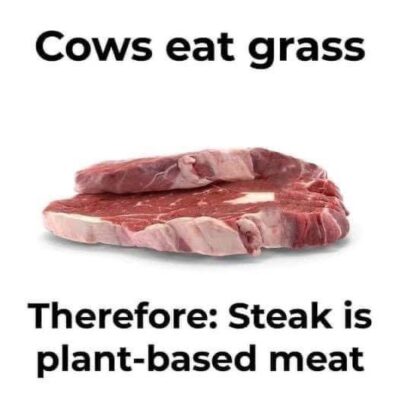A not-so-old adage says cows eat grass; therefore, steak is plant-based meat. I was reminded of that last week when someone was talking to me about some vegan encounter of the third kind—the COIVD-era equivalent of a food Karen.
It occurred to me that vegans are made out of meat. Don’t get Jeffrey Dahmer on me; I’m just putting that out there.
THAT reminded me of a clip I’d shared from season four of Yellowstone. Kevin Costner is John Dutton. He gets a call about an anti-meat protest and briefly chats with the ringleader (Summer) about killing “helpless” animals. It starts with, “You ever plow a field, Summer?, and ends with, “The real question is, how cute does an animal have to be to die before it feeds you.”
I finally got to watch the full episode it is from, and it always makes me smile.
THAT reminded me of the Impossible burger, fake meat, and a parallel lie told by the folks working doubly hard to make an already hard thing (life) more miserable. The claim is that fake meat is better for the planet than the commercial beef industry. We know that’s not true. But then there’s the fake-meat splinter faction that insists lab-grown meat – a new fad embraced by the likes of Bill Jab Em’ All Gates – is better for the planet than the real thing, and (Surprise!) that’s not true either.
In the study, the scientists estimated the energy required for stages of lab-grown meat production, from the ingredients making up the growth medium and the energy required to power laboratories, and compared this with beef.
They largely focused on the quantity of growth medium components, including glucose, amino acids, vitamins, growth factors, salts, and minerals.
They found the “global warming” potential of lab-grown meat ranged from 246 to 1,508 kg of CO2 equivalent per kilogram of lab-grown meat.
The figure is four to 25 times greater than the claimed average “global warming” potential of retail beef.
According to the experts, this does not change depending on which animal’s cells are being grown and the meat that’s being created, whether it’s beef, chicken, or lamb.
It’s a very long and tedious scientific paper with a lot of stuff that is beyond my burger, but the idea itself makes sense. Farming has long been a bogeyman of the CO2 cult and its hippie predecessors. They were concerned about fertilizer, algae bloom, and genetically engineered foods and still are but not genetically modifying vaccines.
They then objected to farming’s massive plumes of carbon dioxide – a number that’s larger when you pretend it’s organic farming, but we are meant to believe that plant-based meat (a lot more agriculture, processing, and manufacturing) wouldn’t make that problem worse – which it actually would and does.
The response to that problem (or so some suggest) is lab-grown meat. Synthetically duplicated meat-like material from something that might be but probably is not meat. That’s going to save us. But what about all the jobs to create those no farms, no food bumper-stickers? No worries. Lab-grown meat is not going to “save us.”
As noted above, growing meat in a lab appears to be twenty-five times more dangerous to the planet (emissions-wise) than beef on the hoof if that sort of thing concerns you. Not I, but the hypocrisy of anti-co2 hypocrites replacing essential protein with garbage whose manufacture releases exponentially more carbon than the real thing (since they pretend to care) does.
It is a process whose “emissions” would fill the bank accounts of advocates who are also doing what they can to make the real thing unaffordable (just like oil, gas, water, electricity, food, housing, travel, …).
I’m just hoping people notice how bad this is all around and push back especially the fake virtue-signaling no-meat planeteers. If things go sideways and badly, they won’t know how to hunt anything but people.
Vegan cannibals. I bet they’ll demand special rights and complain about the emissions from the fires you’ll need to cook and stay warm.
